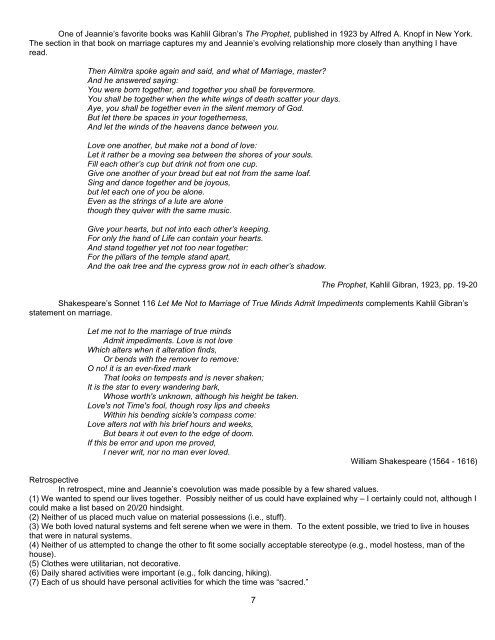You also want an ePaper? Increase the reach of your titles
YUMPU automatically turns print PDFs into web optimized ePapers that Google loves.
One of Jeannie’s favorite books was Kahlil Gibran’s The Prophet, published in 1923 by Alfred A. Knopf in New York.<br />
The section in that book on marriage captures my and Jeannie’s evolving relationship more closely than anything I have<br />
read.<br />
Then Almitra spoke again and said, and what of Marriage, master?<br />
And he answered saying:<br />
You were born together, and together you shall be forevermore.<br />
You shall be together when the white wings of death scatter your days.<br />
Aye, you shall be together even in the silent memory of God.<br />
But let there be spaces in your togetherness,<br />
And let the winds of the heavens dance between you.<br />
Love one another, but make not a bond of love:<br />
Let it rather be a moving sea between the shores of your souls.<br />
Fill each other’s cup but drink not from one cup.<br />
Give one another of your bread but eat not from the same loaf.<br />
Sing and dance together and be joyous,<br />
but let each one of you be alone.<br />
Even as the strings of a lute are alone<br />
though they quiver with the same music.<br />
Give your hearts, but not into each other’s keeping.<br />
For only the hand of Life can contain your hearts.<br />
And stand together yet not too near together:<br />
For the pillars of the temple stand apart,<br />
And the oak tree and the cypress grow not in each other’s shadow.<br />
The Prophet, Kahlil Gibran, 1923, pp. 19-20<br />
Shakespeare’s Sonnet 116 Let Me Not to Marriage of True Minds Admit Impediments complements Kahlil Gibran’s<br />
statement on marriage.<br />
Let me not to the marriage of true minds<br />
Admit impediments. Love is not love<br />
Which alters when it alteration finds,<br />
Or bends with the remover to remove:<br />
O no! it is an ever-fixed mark<br />
That looks on tempests and is never shaken;<br />
It is the star to every wandering bark,<br />
Whose worth's unknown, although his height be taken.<br />
Love's not Time's fool, though rosy lips and cheeks<br />
Within his bending sickle's compass come:<br />
Love alters not with his brief hours and weeks,<br />
But bears it out even to the edge of doom.<br />
If this be error and upon me proved,<br />
I never writ, nor no man ever loved.<br />
William Shakespeare (1564 - 1616)<br />
Retrospective<br />
In retrospect, mine and Jeannie’s coevolution was made possible by a few shared values.<br />
(1) We wanted to spend our lives together. Possibly neither of us could have explained why – I certainly could not, although I<br />
could make a list based on 20/20 hindsight.<br />
(2) Neither of us placed much value on material possessions (i.e., stuff).<br />
(3) We both loved natural systems and felt serene when we were in them. To the extent possible, we tried to live in houses<br />
that were in natural systems.<br />
(4) Neither of us attempted to change the other to fit some socially acceptable stereotype (e.g., model hostess, man of the<br />
house).<br />
(5) Clothes were utilitarian, not decorative.<br />
(6) Daily shared activities were important (e.g., folk dancing, hiking).<br />
(7) Each of us should have personal activities for which the time was “sacred.”<br />
7















